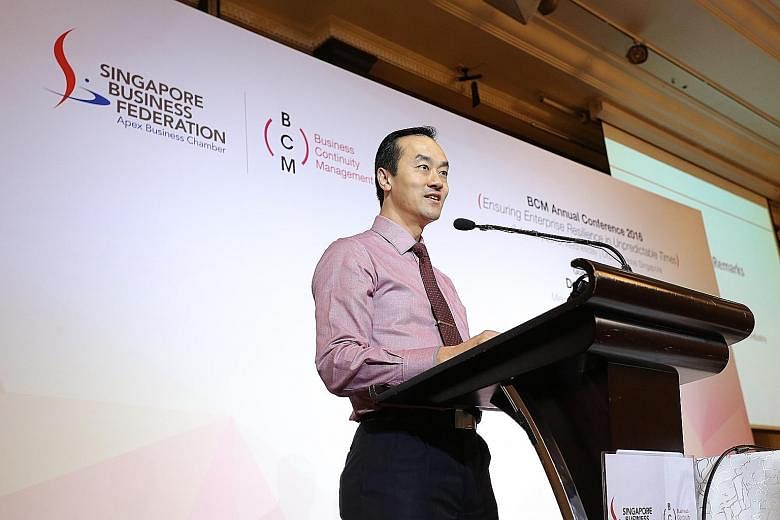As events in the past year have shown, businesses can face all kinds of sudden disruptions, from cyber attacks to collapsed ceilings.
And while most companies are aware that they need contingency plans in place in case of such emergencies, many lack the resources or knowledge to devise such plans or implement them.
The Singapore Business Federation (SBF) launched two new initiatives yesterday to help firms take the first step.
The first will enable small and medium-sized enterprises (SMEs) to receive support from the SBF and Spring Singapore to develop a basic business continuity plan to manage specific disruptions to their operations, such as haze or a pandemic.
The plans will be verified by a third-party auditor to ensure they are robust.
Announcing the initiatives yesterday, Minister of State for Trade and Industry Koh Poh Koon said it has become increasingly important for companies to be well-prepared for disruptions.
"Regionally, the haze from August to October had a significant impact on businesses here, as consumers chose to stay indoors and tourist numbers dropped, while the Middle East Respiratory Syndrome outbreak in South Korea led to cancellations for Singaporean businesses with hospitality and tourism operations in South Korea, such as tour group operators," he noted.
Dr Koh told the annual SBF conference on Business Continuity Management (BCM) that greater global interconnectivity has also made companies more vulnerable to disruptions ranging from cyber attacks to political unrest to minor emergencies such as power outages and ceiling collapses.
The SBF initiative also serves as a stepping stone for SMEs towards a full BCM certification process, which is more comprehensive but also more laborious and costly.
SBF chief executive Ho Meng Kit said the initiative comes after a survey last year showed that Singapore firms are mostly aware of the importance of BCM, but that some are held back from adopting full standards due to a lack of resources, deficient knowledge and skills, and the costs involved to maintain certification.
Business services provider RMA Group's director David Ngoh said, however, that undergoing the full certification process has been worth it for his firm.
"It helps the company culture. As everyone gets involved and understands what needs to be done in the event of minor and major disruptions, back-up procedures can be rolled out quickly. Everyone knows how to activate Plan B."
Getting certified in BCM, as well as other standards such as security, has also helped boost his firm's reputation, especially among big clients such as multi-national firms and government agencies.
This has in turn driven his firm's rapid growth - an average 40 per cent rise in revenue annually over the past 10 years.
The second initiative launched yesterday is a handbook for logistics companies in the cold chain, warehousing and storage industry that will help them assess their readiness against disruptions, and gives them tips on how to improve.


